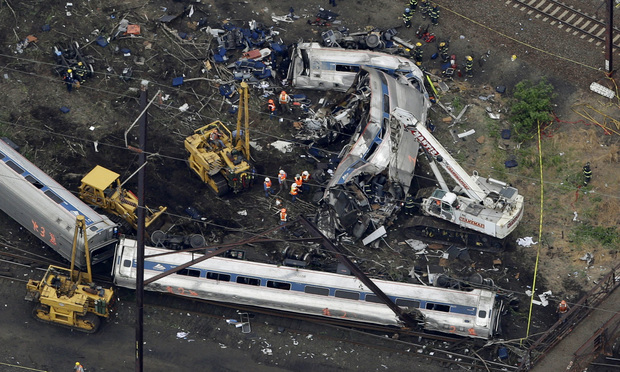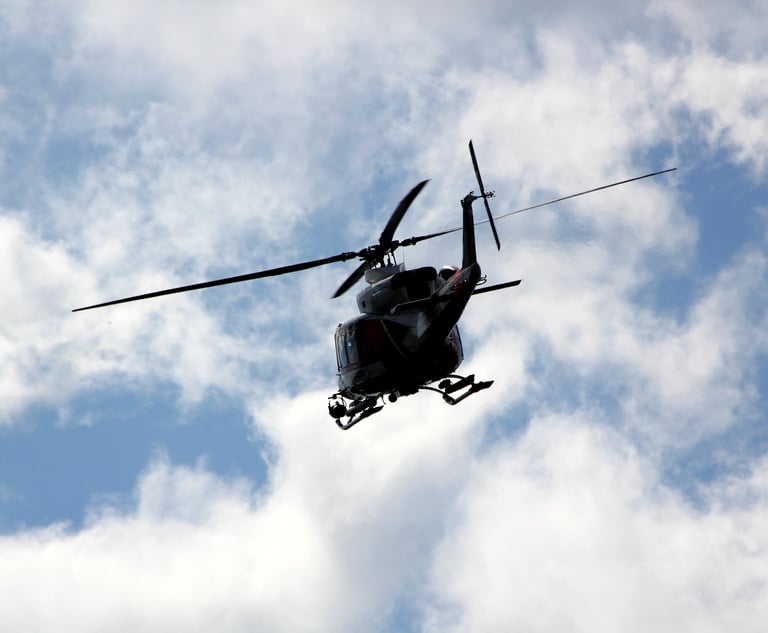Criminal Charges Reinstated—for the Third Time—Against Amtrak Engineer in Fatal 2015 Crash
Prominent attorneys Thomas Kline of Kline & Specter, Robert Mongeluzzi of Saltz, Mongeluzzi & Bendesky and Richard Sprague of Sprague & Sprague filed two private criminal complaints against the Amtrak engineer.
May 14, 2020 at 03:58 PM
5 minute read
 Emergency personnel work at the scene of a deadly Amtrak train derailment in Philadelphia on May 13, 2015. AP Photo/Patrick Semansky
Emergency personnel work at the scene of a deadly Amtrak train derailment in Philadelphia on May 13, 2015. AP Photo/Patrick Semansky
For the third time in as many years, Brandon Bostian, the engineer at the helm during the fatal 2015 Amtrak crash in Philadelphia, is facing criminal charges in connection with the derailment, which left eight dead and dozens more injured.
On Thursday, the Pennsylvania Superior Court reinstated the manslaughter and reckless endangerment charges against Bostian. In a unanimous ruling by a three-judge panel, the judges determined that prosecutors had introduced enough evidence to support the charges, and that Philadelphia Court of Common Pleas Judge Barbara McDermott had improperly dismissed the case last year.
"Given his extensive training and experience and despite having 250 passengers aboard, [Bostian] consciously disregarded a substantial and unjustifiable risk of derailment," Judge Victor Stabile wrote in the court's 30-page opinion. Judges Correale Stevens and Megan McCarthy King joined Stabile's ruling.
McDermott was the second Philadelphia judge to dismiss the charges against Bostian since they were introduced in May 2017.
Even before the charges were first filed, Bostian's case had seen several unusual twists and turns.
In early 2017, the Philadelphia District Attorney's Office initially decided not to bring charges against the engineer, who contended after the crash that he'd sped up through the so-called Frankford Curve in the Port Richmond neighborhood of Philadelphia after receiving reports that assailants had been throwing rocks at other passenger trains. He also said he'd thought he'd reached a high-speed zone.
However, following that decision, prominent attorneys Thomas Kline of Kline & Specter, Robert Mongeluzzi of Saltz, Mongeluzzi & Bendesky and Richard Sprague of Sprague & Sprague filed two private criminal complaints against the Amtrak engineer on behalf of the families, which led then-Municipal Court President Judge Marsha Neifield to order the District Attorney's Office to bring charges.
Local prosecutors ended up referring the case to the Pennsylvania Attorney General's Office, which decided to bring charges against Bostian. However, in September 2017, Municipal Court Judge Thomas Gehret tossed the charges, finding there wasn't enough evidence to show a crime had been committed.
The AG's Office then appealed the case to the Court of Common Pleas, where Philadelphia Judge Kathryn Streeter Lewis reinstated the charges in February 2018.
The charges, however, failed to stick after Bostian's counsel, Brian McMonagle of McMonagle Perri McHugh Mischak Davis, filed a motion for habeas corpus. As a result of the motion McDermott again dismissed the charges in July 2019, finding insufficient evidence.
Generally the concept of coordinate jurisdiction bars two judges from the same bench from overruling each other's decisions. McDermott, however, based her ruling on an exception to that principle, which allows for another judge to rule on the same issue if the other judge's ruling is "clearly erroneous," Stabile said in the Superior Court's decision.
As part of their appeal of McDermott's ruling, the AG's Office had argued that, not only had it presented enough evidence to prosecute Bostian, but McDermott had also violated the coordinate jurisdiction rule.
Stabile said that to make that determination, the frontline appeals court would need to examine whether the prosecutors had shown that Bostian possessed sufficient mens rea to withstand charges of recklessness or gross negligence. Noting case law from the Supreme Court, Stabile said the justices have never determined whether simply falling asleep on the wheel is enough to create a jury question for recklessness, but he noted there were other factors at play.
Specifically, Stabile noted that Bostian was an experienced engineer, and he'd passed rigorous training that included memorizing each portion of the track and the speed limits. Stabile also credited the prosecutors' argument that essentially his only job was to know the route and keep the proper speed.
According to Stabile, McDermott had noted some countervailing evidence about whether he knew he where the train was before the crash occurred, whether he'd been affected by reports that a nearby SEPTA train had been hit with rocks, or whether he was aware of the train's speed. But Stabile said those issues were best left to the jury.
"The prima facie evidence produced by the commonwealth can contradict each of these findings," he said. "At this stage of the proceedings, the commonwealth's evidence must be accepted as true. The weight and credibility of the evidence are not factors at this pretrial stage."
In an emailed statement, McMonagle said he "respectfully disagree[d]" with the Superior Court's holding that the lower court should not have taken into account the evidence about Bostian receiving reports that passenger trains had been hit with stones just prior to accident.
" We believe it would have been unconscionable for the court below to refuse to consider this evidence in evaluating whether whether the commonwealth met is burden of proof," he said. "It is vitally important that we allow our judges to hear and consider admissible evidence at preliminary hearings in determining whether a citizen should be put on trial. This was an accident and not a crime, and we will appeal."
In an emailed statement, a spokesperson for the AG's Office said, "Today the court agreed with our office and ruled the Attorney General can move forward in our work to deliver justice. The families who lost loved ones in this fateful crash and the many passengers who were injured deserve closure."
This content has been archived. It is available through our partners, LexisNexis® and Bloomberg Law.
To view this content, please continue to their sites.
Not a Lexis Subscriber?
Subscribe Now
Not a Bloomberg Law Subscriber?
Subscribe Now
NOT FOR REPRINT
© 2025 ALM Global, LLC, All Rights Reserved. Request academic re-use from www.copyright.com. All other uses, submit a request to [email protected]. For more information visit Asset & Logo Licensing.
You Might Like
View All

Delivery Driver's Slip-and-Fall Suit Slides Forward Against Equipment Rental Company
4 minute read

Judge Leaves Statute of Limitations Question in Injury Crash Suit for a Jury
4 minute readLaw Firms Mentioned
Trending Stories
- 1Patent Pending ... and Pending ... and Pending? Brace Yourself for Longer Waits
- 2Indian Law Firm Cyril Amarchand Rolls Out AI Strategy, Adopts Suite of AI Tools
- 3Which Legal Tech Jobs Are on the Rise, and Which Aren't, with Jared Coseglia
- 4Absent Explicit Agreement, Court Rejects Unilateral Responsiveness Redaction of Text Messages
- 5SEC Whistleblower Program: What to Expect Under the Trump Administration
Who Got The Work
J. Brugh Lower of Gibbons has entered an appearance for industrial equipment supplier Devco Corporation in a pending trademark infringement lawsuit. The suit, accusing the defendant of selling knock-off Graco products, was filed Dec. 18 in New Jersey District Court by Rivkin Radler on behalf of Graco Inc. and Graco Minnesota. The case, assigned to U.S. District Judge Zahid N. Quraishi, is 3:24-cv-11294, Graco Inc. et al v. Devco Corporation.
Who Got The Work
Rebecca Maller-Stein and Kent A. Yalowitz of Arnold & Porter Kaye Scholer have entered their appearances for Hanaco Venture Capital and its executives, Lior Prosor and David Frankel, in a pending securities lawsuit. The action, filed on Dec. 24 in New York Southern District Court by Zell, Aron & Co. on behalf of Goldeneye Advisors, accuses the defendants of negligently and fraudulently managing the plaintiff's $1 million investment. The case, assigned to U.S. District Judge Vernon S. Broderick, is 1:24-cv-09918, Goldeneye Advisors, LLC v. Hanaco Venture Capital, Ltd. et al.
Who Got The Work
Attorneys from A&O Shearman has stepped in as defense counsel for Toronto-Dominion Bank and other defendants in a pending securities class action. The suit, filed Dec. 11 in New York Southern District Court by Bleichmar Fonti & Auld, accuses the defendants of concealing the bank's 'pervasive' deficiencies in regards to its compliance with the Bank Secrecy Act and the quality of its anti-money laundering controls. The case, assigned to U.S. District Judge Arun Subramanian, is 1:24-cv-09445, Gonzalez v. The Toronto-Dominion Bank et al.
Who Got The Work
Crown Castle International, a Pennsylvania company providing shared communications infrastructure, has turned to Luke D. Wolf of Gordon Rees Scully Mansukhani to fend off a pending breach-of-contract lawsuit. The court action, filed Nov. 25 in Michigan Eastern District Court by Hooper Hathaway PC on behalf of The Town Residences LLC, accuses Crown Castle of failing to transfer approximately $30,000 in utility payments from T-Mobile in breach of a roof-top lease and assignment agreement. The case, assigned to U.S. District Judge Susan K. Declercq, is 2:24-cv-13131, The Town Residences LLC v. T-Mobile US, Inc. et al.
Who Got The Work
Wilfred P. Coronato and Daniel M. Schwartz of McCarter & English have stepped in as defense counsel to Electrolux Home Products Inc. in a pending product liability lawsuit. The court action, filed Nov. 26 in New York Eastern District Court by Poulos Lopiccolo PC and Nagel Rice LLP on behalf of David Stern, alleges that the defendant's refrigerators’ drawers and shelving repeatedly break and fall apart within months after purchase. The case, assigned to U.S. District Judge Joan M. Azrack, is 2:24-cv-08204, Stern v. Electrolux Home Products, Inc.
Featured Firms
Law Offices of Gary Martin Hays & Associates, P.C.
(470) 294-1674
Law Offices of Mark E. Salomone
(857) 444-6468
Smith & Hassler
(713) 739-1250





